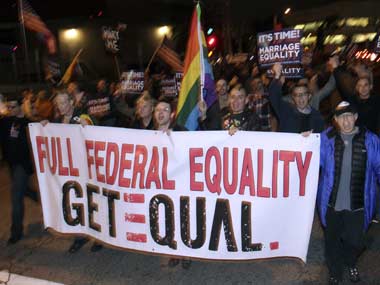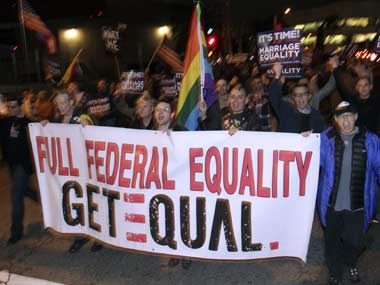Trenton, New Jersey: The New Jersey Assembly passed legislation legalizing same-sex marriage on Thursday, sending the measure to Republican Governor Chris Christie, a possible US vice presidential candidate who has promised a veto. The Assembly vote of 42-33 affirmed a Senate vote from Monday and increased the scrutiny on Christie, a supporter of Republican presidential hopeful Mitt Romney who has attempted to deflect controversy by saying the matter should be settled by voters in a referendum. Both chambers appear to lack the two-thirds majority needed to override a veto. Christie’s spokesman said the governor would have no comment on the legislation on Thursday, but he has been emphatic in the past about his intention to veto it. In Maryland, the state House of Delegates was due to debate a similar initiative legalizing same-sex marriage, highlighting a contentious social issue gaining prominence in a presidential election year. [caption id=“attachment_216346” align=“alignleft” width=“380” caption=“Reuters”]
 [/caption] The action in the Maryland and New Jersey statehouses follows passage of legislation in Washington state. Governor Christine Gregoire signed the Washington bill on Monday, but it will not take effect until at least June. Opponents are working to gather signatures for a ballot initiative in November that would block the legislation. Same-sex couples can marry legally in New York, Massachusetts, Connecticut, New Hampshire, Vermont, and Iowa, as well as the District of Columbia. In California, a federal appeals court earlier this month overturned that state’s gay marriage ban, enacted through a 2008 ballot initiative. That sets up a possible showdown in the U.S. Supreme Court over the matter. New Jersey’s Democratic leadership, which controls both houses of the legislature, has made gay marriage a top priority this session, saying the state’s civil union law does not adequately protect same-sex couples. “Now is not the time to punt. Now is the time to stand up for what is right,” Assembly Majority Leader Louis D. Greenwald told the chamber during the debate. Republican Jay Webber argued the state’s civil union law grants “all the rights” to gay and lesbian couples. “There is no evidence of wholesale trampling of civil rights,” he said. NEXT: VETO? The initiative now shifts to Christie, who has 45 days to veto the bill but has vowed to do so immediately. Democrats do not appear to have enough votes to override a veto with a two-thirds majority, though they have until the end of 2013 to try. The Senate would need 27 votes, or three more than voted in favor of the bill on Monday, to override a veto. The Assembly would need to find an additional 12 votes to reach the required 54. Christie called Monday’s Senate vote a “good bunch of theater” and told reporters, “Well, they won’t get enough votes to override my veto.” In Maryland, debate was due to begin Thursday evening in the House of Delegates amid uncertainty whether proponents of the “Civil Marriage Protection Act” had the 71 votes needed to advance it to the state Senate. Comparable legislation passed the Maryland Senate last year but failed in the House when a number of African-American Democrats joined Republicans in opposing the bill. Democratic Governor Martin O’Malley, a gay marriage supporter, has attempted to sway the black lawmakers, many of whom are hesitant to back an issue opposed by much of the state’s black clergy. Delegate Talmadge Branch, a black Democrat from Baltimore, said the vote was “very close.” “I am opposing it based on my district that I represent,” Branch said, describing his district as working class. “It’s basically more geography for me than anything.” Reuters
[/caption] The action in the Maryland and New Jersey statehouses follows passage of legislation in Washington state. Governor Christine Gregoire signed the Washington bill on Monday, but it will not take effect until at least June. Opponents are working to gather signatures for a ballot initiative in November that would block the legislation. Same-sex couples can marry legally in New York, Massachusetts, Connecticut, New Hampshire, Vermont, and Iowa, as well as the District of Columbia. In California, a federal appeals court earlier this month overturned that state’s gay marriage ban, enacted through a 2008 ballot initiative. That sets up a possible showdown in the U.S. Supreme Court over the matter. New Jersey’s Democratic leadership, which controls both houses of the legislature, has made gay marriage a top priority this session, saying the state’s civil union law does not adequately protect same-sex couples. “Now is not the time to punt. Now is the time to stand up for what is right,” Assembly Majority Leader Louis D. Greenwald told the chamber during the debate. Republican Jay Webber argued the state’s civil union law grants “all the rights” to gay and lesbian couples. “There is no evidence of wholesale trampling of civil rights,” he said. NEXT: VETO? The initiative now shifts to Christie, who has 45 days to veto the bill but has vowed to do so immediately. Democrats do not appear to have enough votes to override a veto with a two-thirds majority, though they have until the end of 2013 to try. The Senate would need 27 votes, or three more than voted in favor of the bill on Monday, to override a veto. The Assembly would need to find an additional 12 votes to reach the required 54. Christie called Monday’s Senate vote a “good bunch of theater” and told reporters, “Well, they won’t get enough votes to override my veto.” In Maryland, debate was due to begin Thursday evening in the House of Delegates amid uncertainty whether proponents of the “Civil Marriage Protection Act” had the 71 votes needed to advance it to the state Senate. Comparable legislation passed the Maryland Senate last year but failed in the House when a number of African-American Democrats joined Republicans in opposing the bill. Democratic Governor Martin O’Malley, a gay marriage supporter, has attempted to sway the black lawmakers, many of whom are hesitant to back an issue opposed by much of the state’s black clergy. Delegate Talmadge Branch, a black Democrat from Baltimore, said the vote was “very close.” “I am opposing it based on my district that I represent,” Branch said, describing his district as working class. “It’s basically more geography for me than anything.” Reuters
New Jersey Assembly OKs gay marriage; veto awaits
FP Archives
• February 17, 2012, 08:00:55 IST
The Assembly vote of 42-33 affirmed a Senate vote from Monday and increased the scrutiny on Christie, a supporter of Mitt Romney, who has attempted to deflect controversy by saying the matter should be settled by voters in a referendum.
Advertisement
)